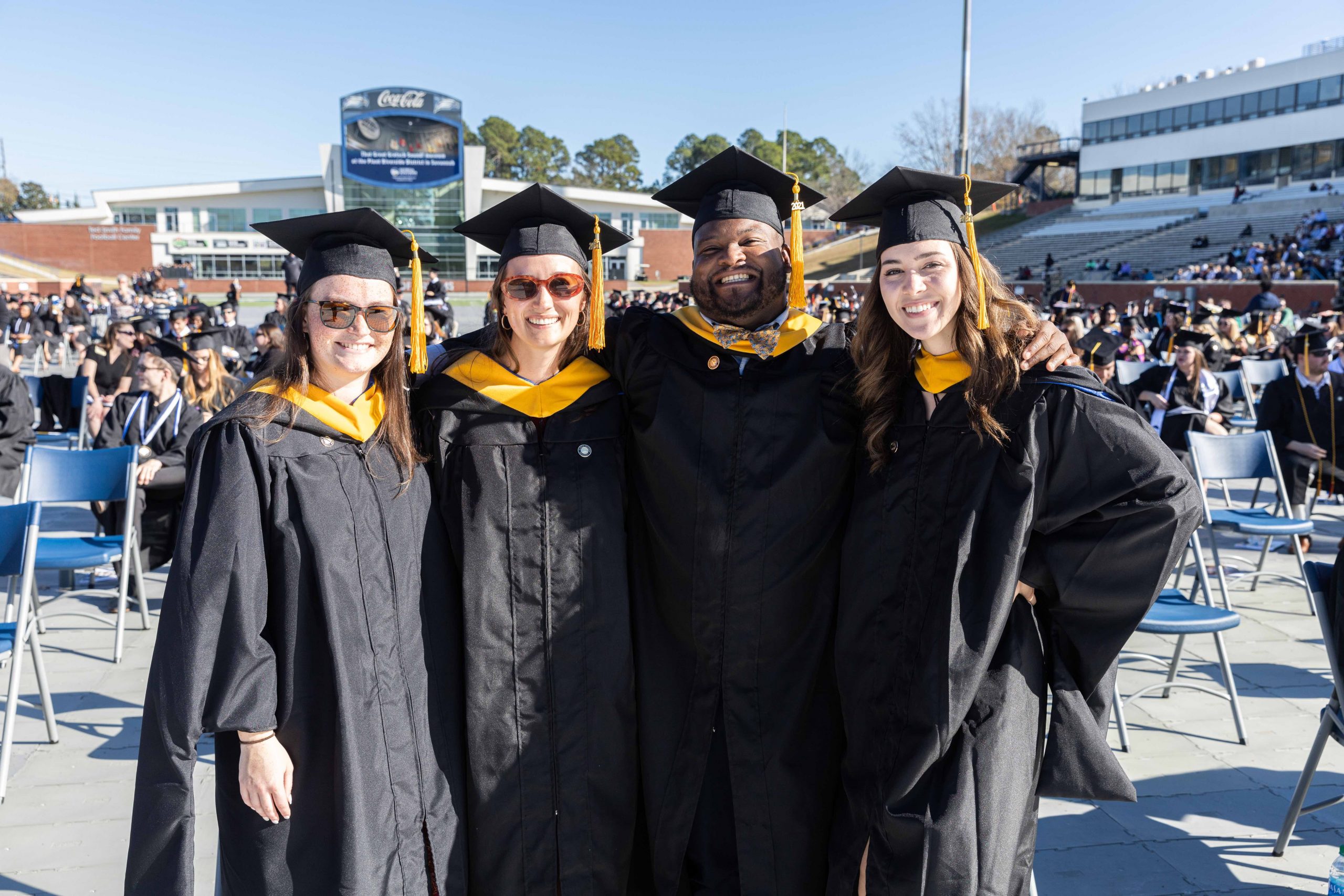Experts Matter. Find Yours.
Connect for media, speaking, professional opportunities & more.

Hats off to the 2,100 graduates at Georgia Southern
Last week, approximately 2,100 undergraduate and graduate students from Georgia Southern University’s Statesboro, Armstrong and Liberty campuses received associate, baccalaureate, master’s, specialist and doctoral degrees in three Fall 2021 Commencement ceremonies. Georgia Southern President Kyle Marrero welcomed the graduates and their families to the University’s Fall Commencement ceremonies, held at the Savannah Convention Center in Savannah on Dec. 11, and the Allen E. Paulson Stadium in Statesboro on Dec. 13 and 14. He commended the graduates on their achievements and tenacity. “Graduates, I don’t need to tell you about your unique college journey, which has been challenging for all of us,” said Marrero. “I am very proud of how, together, we have persevered allowing us to have a successful semester and today, our commencement ceremony. You, our graduates, deserve great recognition.” During the Savannah ceremony, Georgia’s 2022 Teacher of the Year Cherie Dennis (Armstrong ‘10), who teaches English to Speakers of Other Languages at Hesse K-8 School in Savannah-Chatham County Public Schools, addressed the packed house with a call for kindness. “My hope for you is that you go out into the world with your eyes and your hearts wide open,” she said. “That you go out into the world and make something beautiful out of its cracks and imperfections. A world that is bound together by the irrefutable strength and integrity of kindness. Be the repairers of the world; the menders of the world; the bridge builders; the constructive, contributive citizens who nurture communities large and small. And that may sound daunting, but really it all starts with something so very simple, something so very possible and within your reach. Something you knew how to do even as a child. Just being kind.” Sachin Shailendra, chair of the University System of Georgia Board of Regents and president of SG Contracting, Inc. in Atlanta, spoke at the first ceremony in Statesboro. “Georgia Southern – which in a few minutes will be your alma mater – is one of the shining stars among our 26 institutions,” he said. “It ranks as one of Georgia’s best comprehensive universities, with a growing reputation for research that impacts not only vital industries but the environment and our communities. The degree you earned lets everyone know you learned from outstanding faculty, top staff and talented fellow students. “The opportunities ahead of you are many. I know this because of my own experience. I was born in Georgia, but my father was not. I am only a generation away from the farmers my family were in India. Education has been a game changer for both me and my family, and I know it’s a major accomplishment for many of you. I hope your degree will inspire you to take the next steps in building your future. So go out into the world and create a worthy future, not only for yourselves, but one that will represent Georgia Southern, our entire university system, and this state as well…Your education has already changed you. It also has the power to change your community, and move our state forward in exciting ways.” To read the full release please see the attachment below. This is a great moment for Georgia Southern University and if you are looking to learn more about this year's graduating class or the school - then let us help. Simply reach out to Georgia Southern Director of Communications Jennifer Wise at jwise@georgiasouthern.edu with your questions or to arrange an interview today.

New £1.5 million healthcare simulation facilities to open at Aston University
New clinical simulation facilities for medical, pharmacy and optometry students are set to open in 2022 Including an ocular simulation unit facility which will be the only one in Europe, as part of further investment in clinical facilities in the College of Health and Life Sciences at Aston University. The facilities are part funded by the Office for Students which awarded the University £806,226 to set up a ‘high fidelity’ simulation A&E room with further expenditure by Aston University on an ocular simulation unit. Aston Medical and Pharmacy School students will be able to practise in emergency settings using high quality manikins where they will simulate treating patients for acute conditions such as a heart attack or learning how to intubate a patient onto a ventilator. The high-fidelity acute care simulation room will be equipped with recording facilities, a debrief room and control room. The funding will allow for the purchase of other training equipment such as a hospital grade bed and single task trainer simulation equipment. For example, male and female catheterisation models, pelvic and rectal trainers, venepuncture arms, breast trainers and abdominal trainers. Professor Liz Moores, deputy dean of the College of Health and Life Sciences, said: “We are really excited to have the support from both the Office for Students and Aston University in building these state-of-the-art facilities for our students and can’t wait to start using them. “The acute care simulation room will allow us to simulate a variety of emergency resuscitation scenarios that are very difficult to teach in real life situations, such as heart attacks, acute breathlessness and severe allergic reaction and will be of great value in training students of medicine and pharmacy.” Students in the School of Optometry will also be equipped with simulation facilities to carry out treatment on patients. Professor James Wolffsohn, head of the School of Optometry said: “The ocular simulation facility at Aston University will be unique in Europe, allowing students to refine their skills in examining the health of the front and back of the eyes and to experience a wide range of eye disease. “One of the simulators even allows them to utilise their smartphone to practice at home. They can gain direct feedback and be assessed by the simulators, allowing more flexible, diverse and intensive learning than can be achieved with clinical practice placements.” It is hoped these facilities will help plug some of the gaps in clinical placements that are currently affecting students since the COVID-19 pandemic. As a result of the pandemic, alternative ways are being explored to gain high quality authentic ‘clinical’ experiences, whilst not exposing patients, staff, or students, to risk. The health crisis has also increased pressure on the NHS creating a need for alternative but appropriate training facilities, to ensure that students are fully prepared for the medical profession. The simulation facilities are due to be open in time for the September 2022 intake of students.

Head of School of Optometry named world expert in contact lenses
Professor James Wolffsohn, head of the School of Optometry at Aston University has been named by Expertscape as a world expert in contact lenses research based on his publications. Expertscape's PubMed-based algorithms placed professor Wolffsohn in the top 0.1 per cent of scholars writing about contact lenses over the past 10 years. He is also ranked by the same organisation as a world expert in presbyopia (the loss of eye focus with age affecting near vision), and is one of the top three scholars in the world. Expertscape is designed to help find the most knowledgeable physicians and health professionals in the world. Expertscape objectively ranks people and institutions by their expertise in more than 27,000 biomedical topics. James’ research focuses of the development, enhancement and validation of ophthalmic instrumentation to optimise contact lens comfort and fitting. He is also pioneering the use of contact lenses as a treatment for dry eyes; and developing methods to restore more natural eye focus through intraocular lenses, that are implanted into the eye as part of cataract surgery; as well as pharmaceutical approaches. Professor James Wolffsohn said: “I am delighted that our research in the field of contact lenses and presbyopia has had the desired impact and is widely read and cited. “Working together with colleagues in industry, we are able to accelerate product innovation, development and validation, leading to enhanced quality of life in patients.” James has published over 280 peer reviewed academic papers and given numerous international presentations. His main research areas are the development and evaluation of ophthalmic instrumentation, contact lenses, intraocular lenses and the tear film. A contact lens is a corrective, cosmetic, or therapeutic lens usually placed on the cornea of the eye. Contact lenses usually serve the same corrective purpose as conventional glasses, but are lightweight and virtually invisible. It has been estimated that about 125 million people use contact lenses worldwide. Presbyopia is the loss of eye focus with age which is usually noticed by ~45 years of age when reading glasses or another form of refractive correction is needed. It has a marked emotional effect being one of the first apparent signs of ageing.

Aston University professor named world expert in type 2 diabetes mellitus
Aston University professor emeritus, Cliff Bailey has been named as a world expert in type 2 diabetes mellitus by Expertscape, based on his research publications over the last ten years. Expertscape is designed to help find the most knowledgeable physicians and health professionals in the world. It objectively ranks people and institutions by their expertise in more than 27,000 biomedical topics. The announcement coincides with World Diabetes Day on 14 November – which marks the birthday of Frederick Banting, one of the discoverers of insulin. Cliff Bailey, professor of clinical science, and his colleagues in the College of Health and Life Sciences contributed key information to the development of metformin, now the most prescribed medicine in the world for the treatment of type 2 diabetes which is also on the World Health Organisation’s (WHO) list of essential medicines. More recently Cliff has been involved in the development of a new class of agents called SGLT2 inhibitors which are being used alongside metformin in the treatment of type 2 diabetes. Professor Cliff Bailey said: “I’m really pleased that our work continues to help people with diabetes to control their blood glucose and stay healthy.” Cliff has received several awards including the Banting Memorial Lecture Award – the highest award of Diabetes UK - and the Outstanding Achievement Award of the Lunar Society. Type 2 diabetes is the most common type of diabetes that affects more than 400 million people worldwide, including over four million people in the UK. It usually develops in middle or later life, is characterised by excess glucose in the blood, and usually results from a combination of impaired production and impaired activity of the hormone insulin. Type 2 diabetes has extensive detrimental effects on the heart, blood vessels, kidneys, eyes and nerves, and accounts for about 10% of the NHS budget.

Tomorrow's Election Day, and it’s all eyes on Virginia!
In what is shaping up to be one of the most contested gubernatorial races in recent history, it’s all coming down to Election Day. Media from across the country are all watching and trying to get all the expert insight they can on why this election is so important and what winning or losing could mean for not just the state – but the mid-term elections coming up next November. UMW’s Stephen Farnsworth is the ‘go-to’ for major media outlets across America and for international media following U.S. and Virginia politics. Recently, CBS News called on him to lend his expertise on just where this race sits. "The race for governor in Virginia is in its final stretch with just two weeks to go before Election Day. Former Governor Terry McAuliffe, the Democratic candidate, and Republican nominee Glenn Youngkin have clashed on several issues related to schools from charter schools to vaccine mandates for teachers and students. Stephen Farnsworth, director of the Center for Leadership and Media Studies at the University of Mary Washington, joins CBSN AM to discuss." October 19 - CBS News Dr. Stephen Farnsworth is a sought-after political commentator on presidential politics. He has been widely featured in national media, including The Washington Post, Reuters, The Chicago Tribune and MSNBC. If you are a reporter covering Virginia's gubernatorial race, simple click on his icon to arrange an interview today.

All eyes on Virginia – What’s at stake as the race for Governor goes into overdrive
Virginians are already voting to elect a new governor – and as political junkies, pundits and media across America know, this race could paint a picture of what’s to come in next year’s midterm elections and even as far away as 2024. Stephen Farnsworth, a political science professor at University of Mary Washington, said Mr. Biden's ability to sell his agenda will be "significantly deteriorated" if Republicans win the governor's mansion in Virginia. "If a Biden-like message offered by McAuliffe doesn't succeed in purple Virginia, a lot of Democrats around the country will wonder if it makes more sense to chart a more independent course," he said. CBS News – October 07 Dr. Stephen Farnsworth is a sought-after political commentator on presidential politics. He has been widely featured in national media, including The Washington Post, Reuters, The Chicago Tribune and MSNBC. If you are a reporter covering Virginia's gubernatorial race, simple click on his icon to arrange an interview today.

Three Aston University STEM pioneers shortlisted for Women in Tech Awards
• Three finalists from Aston University shortlisted for prestigious Women in Tech Awards • Two academics are up for the award which will be announced in October • A degree apprentice has also been nominated in the category Three STEM pioneers from Aston University are celebrating after being shortlisted for the prestigious Midlands Women In Tech Awards. Aston University’s Reham Badawy and Lucy Bastin have picked up nominations for the academic category while Jessica Morgan has been put forward for the apprentice category for the awards. The Midlands Women in Tech Awards are an opportunity to highlight and recognise the ongoing contribution of women in the tech sector. The aim of the awards is to raise the visibility of women in the tech space and enable the next generation to ‘see it and therefore aspire to it’. Jessica Morgan is studying a Digital Technology Solutions apprenticeship with Cap Gemini and Aston University, with experience working on projects within the public sector. She is in the final year of her degree apprenticeship and has been balancing work, studying and volunteering, while being on track for a first class honours. Reham Badawy is part of the Undergraduate Teaching Team at Aston University. Her research work has used smart tech to detect and monitor symptoms of Parkinson’s disease. She is a strong advocate for women in STEM and is a UK Ambassador for Women are Boring. Lucy Bastin has a Masters in GIS and a PhD in Urban Ecology. She is a senior lecturer in Computer Science and was recently on secondment to the Joint Research Centre of the European Commission. She developed web-based biodiversity information systems that support accessible and user-friendly reporting by the international community against policy and conservation targets such as the Sustainable Development Goals. Professor Kate Sugden, deputy dean for the College of Engineering and Physical Sciences at Aston University said: “We are delighted to see so many Aston University shortlisted candidates for the Women in Tech Awards. “In our eyes they are all winners and are great examples of our ongoing commitment to making significant contributions to the region and wider society.” Voting closes on August 20 and more details about the finalists can be found here: www.womenintechawards.co.uk The ceremony takes place on 7 October where the winners will be announced.

Villanova Expert Reflects on Historic Number of Golden Globe-Nominated Female Directors
For the first time in the Golden Globes Awards’ history, three women were nominated for best director. "We went from barely getting one in a category to a majority," said Teresa Boyer, EdD, founding director of Villanova University's Anne Welsh McNulty Institute for Women's Leadership. But why are we seeing this change in narrative in 2021? "One wonders if this is in response to the pushback from so many past years, a growth in dogged pursuit of success of the women in the field or a change in both how we may have viewed movies and television in the past year," said Dr. Boyer. "While likely all of the above, one would think that the way we viewed our screen-based entertainment, with the majority being streaming activities, might have allowed audiences to explore films they would not have been as likely to pursue in the traditional 'group-goes-to-a-theater' method." Not only is there more to watch using streaming services, but online platforms could also allow for more diversity in options. "When we have the opportunity to choose anything we like, without being beholden to others in our social groups, we may find that the directors’ lenses are a better match to those of their audience." Increased options could also help more people see themselves represented on screen. "There is a reason why we say, 'representation matters.' For young women and people of color with an interest in the field, being able to see people who look like them lauded in the most highly prized mainstream award ceremonies sends the message that they too are welcome... and their leadership potential is not limited. It may also open the eyes of their peers and others in the field who previously discounted the value of their work and potential based solely on their perceptions of who should be making films."

Why do presidential inaugurations matter? Let our expert explain
All eyes are on Washington on Wednesday as the country, and the world for that matter, tune in to watch the inauguration ceremony of Joe Biden as President of the United States. It’s a formal occasion, and one that comes with pomp and circumstance – but after the speeches and the parties, is it a day that really has significance? It’s a question that’s being asked, and one that Dimitris Xygalatas, an anthropologist and cognitive scientist at the University of Connecticut, decided to answer in a recent contribution to The Conversation. In the piece, he examines the appeal of such special and momentous occasions on society and why rituals have a great impact on the public’s perception on major events. The piece is attached – and if you are a reporter looking to learn more of speak to Professor Xygalatas about the significance of the inauguration, simply click on his icon to arrange an interview now.

After an incited and encouraged crowd of Trump supporters stormed the Capitol buildings last earlier this month – social media, or at least the executives that run companies like Twitter and Facebook had had enough and opted to oust President Donald Trump from their platforms. Donald Trump has been ‘deplatformed’ and no longer has easy access to an audience of millions of followers. The concept of deplatforming is being widely debated. And recently, University of Connecticut’s Ugochukwu Etudo was asked to lend his expert perspective on the idea. Does the deplatforming of prominent figures and movement leaders who command large followings online work? That depends on the criteria for the success of the policy intervention. If it means punishing the target of the deplatforming so they pay some price, then without a doubt it works. For example, right-wing provocateur Milo Yiannopoulos was banned from Twitter in 2016 and Facebook in 2019, and subsequently complained about financial hardship. If it means dampening the odds of undesirable social outcomes and unrest, then in the short term, yes. But it is not at all certain in the long term. In the short term, deplatforming serves as a shock or disorienting perturbation to a network of people who are being influenced by the target of the deplatforming. This disorientation can weaken the movement, at least initially. However, there is a risk that deplatforming can delegitimize authoritative sources of information in the eyes of a movement’s followers, and remaining adherents can become even more ardent. Movement leaders can reframe deplatforming as censorship and further proof of a mainstream bias. There is reason to be concerned about the possibility that driving people who engage in harmful online behavior into the shadows further entrenches them in online environments that affirm their biases. Far-right groups and personalities have established a considerable presence on privacy-focused online platforms, including the messaging platform Telegram. This migration is concerning because researchers have known for some time that complete online anonymity is associated with increased harmful behavior online. In deplatforming policymaking, among other considerations, there should be an emphasis on justice, harm reduction and rehabilitation. Policy objectives should be defined transparently and with reasonable expectations in order to avoid some of these negative unintended consequences. January 15 – The Conversation If you’re a journalist covering deplatforming and would like to talk with Ugochukwu Etudo – simply click on his icon today and we’ll arrange an interview today.





